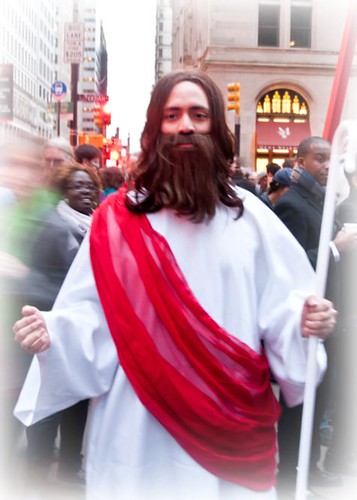 From very early in the movement, spirituality and faith have played a role in the Occupy movement. Religious observances began happening at Occupy Wall Street and around the country, such as the Muslim Jumu’ah and the Jewish Kol Nidre. Religious leaders have come out in support of the Occupy movement, and its social vision, especially in the wake of the wave of crackdowns by local governments on the movement in November. Jim Wallis, President and CEO of Sojourners and member of the Office of Faith-based and Neighborhood Partnerships, called upon faith communities to welcome and shelter the Occupiers:
From very early in the movement, spirituality and faith have played a role in the Occupy movement. Religious observances began happening at Occupy Wall Street and around the country, such as the Muslim Jumu’ah and the Jewish Kol Nidre. Religious leaders have come out in support of the Occupy movement, and its social vision, especially in the wake of the wave of crackdowns by local governments on the movement in November. Jim Wallis, President and CEO of Sojourners and member of the Office of Faith-based and Neighborhood Partnerships, called upon faith communities to welcome and shelter the Occupiers:
It’s time to invite the Occupy Movement to church! And Thanksgiving is the perfect occasion. Have some of the young protesters—the “99ers” as they’re becoming known—from this rapidly growing movement over for a big holiday dinner!
Our faith communities and organizations should swing their doors wide and greet the Occupiers with open arms, offering them a feast to say “thank you” for having the courage to raise the very religious and biblical issue of growing inequality in our society.
The message seems to have been taken up by different religious congregations around the country. Writing for Religious News Service, Josef Kuhn notes that:
A recent poll by the Public Religion Research Institute and Religion News Service found that less than a third of Americans say the Occupy movement represents their values, but the police evictions seem to have boosted religious support for the movement.
According to Ellick, more than 1,400 faith leaders from around the country have signed a pledge of solidarity with Occupy protesters, many of them jumping in only after police cleared Zuccotti Park.
Across the Atlantic, Steve Doughty of the Daily Mail reports on perhaps the most prominent religious leader to declare support for the Occupy movement to date:
Jesus would spend Christmas with the St Paul’s Cathedral protesters, the Archbishop of Canterbury said yesterday.
Dr Rowan Williams declared that Christ would be ‘there, sharing the risks, not just taking sides.’
Of course, not everyone agrees with the supportive stance of some religious leaders toward the Occupy movement. In particular, Tony Perkins, President of the Family Research Council, draws on Biblical text to say that Jesus would in fact be a proponent of the free market:
But just what does Jesus’ order to occupy mean? Does it mean take over and trash public property, as the Occupy movement has? Does it mean engage in antisocial behavior while denouncing a political and economic system that grants one the right and luxury to choose to be unproductive?
No, the Greek term behind the old English translation literally means “be occupied with business.” As with all parables, Jesus uses a common activity such as fishing or farming to provide a word picture with a deeper spiritual meaning…The fact that Jesus chose the free market system as the basis for this parable should not be overlooked.
Sacred spaces such as interfaith tents have been, and continue to be, locations of meditation, prayer, and reflection for the protestors. Now that the local governments have evicted them from their physical locations, it will be interesting to see the role that religious institutions and their leaders will play in the movement. For more on the Occupy movement, please visit Possible Futures, produced by the Social Science Research Council, in conjunction with an SSRC book series published by NYU Press.












